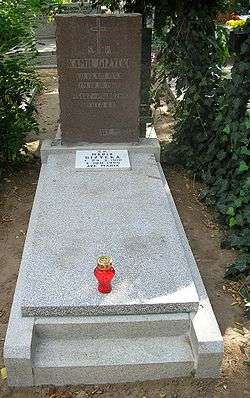Kamil Giżycki
Kamil Giżycki (19 August 1893, at Grybów – 19 April 1968, at Wrocław) was a Polish writer and traveler.

Giżycki studied at the famous Jesuit school Zakład Naukowo-Wychowawczy Ojców Jezuitów w Chyrowie in Khyriv. He graduated from Technical University of Munich. During the First World War he served in Austro-Hungarian army and he was injured and captured by Russian soldiers. As a prisoner of war Giżycki was sent to Siberia. After the outbreak of the February Revolution of 1917, Giżycki served in Czechoslovak Legions and in Polish 5th Division (since January 1919) and fought with Bolsheviks. After surrender of the 5th Division (January 1920) Giżycki escaped from Bolsheviks and joined in White Russian guerillas in Uriankhai. In 1920/1921 he moved to north-western Mongolia and he joined baron Roman Ungern von Sternberg's army known as Asian Cavalry Division as an officer and engineer. He also briefly became Ungern von Sternberg's political advisor and chief of engineer troop, which manufactured land mines, hand grenades, chemical warfare etc. Giżycki took part in Ungern's last campaign to liberate Transbaikalia from Bolsheviks, in their march across the mountains separating Mongolia from Russia and all the battles against the overwhelming numerical superiority of the Bolshevik foe, the final retreat from near Ulan-Ude in Buryatia across the mountains, steppe and swamps back to Mongolia, where near the Egiin Gol River exhausted baron's army collapsed on 17–18 August 1921, and baron was betrayed by two Russian officers who handed him over to the Bolsheviks. Giżycki together with part of the 2nd Brigade of Ungern's army, pursued by the bolshevik's Red Army units, retreated fighting the enemy and the elements from North-Central Mongolia, south of Urga and then through northern Gobi to Chinese Manchuria. There like the rest of the officer corps of the 2nd Ungern's Brigade he joined the Chinese forces and served as a military instructor in army of Zhang Zuolin and next he was employment as an engineer of the Chinese Eastern Railway. In summer 1922, Giżycki joined the army of White general Anatoly Pepelyayev. In 1923 Kamil Giżycki returned to Poland and settled near Lviv. He was a member of the expedition headed by Ferdynand Antoni Ossendowski to western Africa in 1926. In 1934 Giżycki settled in Liberia where he bought a plantation. Just before Polish Defensive War in 1939 Giżycki returned to Poland and took part in fight against Germany. He was officer of Armia Krajowa. After the war, Giżycki lived at Wrocław and published numerous novels about Africa. He was a prolific writer of books and articles, and his recollections about his life during the 1920-21 in southern Siberia and Mongolia are one of the most important primary sources about the Mongolia and her inhabitants prior to the Communist rule, the life and last campaign of general Ungern-Sternberg, Bolshevik rule in southern Siberia, and flora and fauna of Central Asia.
Published books
- Polowania egzotyczne, 1927, Wyd. Zakł. Narodowy im. Ossolińskich, Lwów.
- Przez Urianchaj i Mongolię. Wspomnienia z lat 1920-21 (through Urianchai and Mongolia. Recollection of 1920–21 years), (1929 Dom Książki Polskiej, Lwów: Zakł. Narodowy im. Ossolińskich; 2007 and 2011 Wyd. LTW)
- Ze Wschodu na Zachód. Listy z podróży, 1930 „Księg. Polska" Tow. Polskiej Macierzy Szkolnej, Warszawa
- Przez knieje i stepy, 1930 and 1938, Księg. św. Wojciecha Poznań.
- Wielkie czyny szympansa Bajbuna Mądrego 1947 - Wydaw. Polskie R. Wegner, Toruń : Toruńskie Zakłady Graficzne; 1960 Warszawa : "Nasza Księgarnia"; 2007 - Warszawa : Polityka. Spółdzielnia Pracy; also German version: Die grossen Taten des Schimpansen Beybun Hofberater seiner Majestät des Königs Simba : Negermärchen. 1957, Berlin, A. Holz)
- Wężowa Góra, opowieści z puszczy liberyjskiej, 1958; 1975 Zakład Narodowy im. Ossolińskich
- Na Samotnym Atolu, 1958 (German version: Berlin, 1960, 1964, 1966 Das einsame Atoll A. Holz; 1962 Verlag Kultur und Fortschritt)
- Nil, rzeka wielkiej przygody, 1959, 1972, 1983 (Nasza Księgarnia, Warszawa)
- Listy z archipelagu Salomona "Ossolineum", Wrocław; also Russian version (Pisma s Solomonovyh ostrovov, Nauka, Moscow, 1974) and Latvia version (Vēstules no Zālamana salām Riga : "Zinātne", 1979)
- Hebanowa miłość, 1960 Zakład Narodowy im. Ossolińskich, Wrocław,
- Hevea płacze kauczukiem, 1962 Wyd. Śląsk.
- Lwica Uanga 1969 and 1980 (Nasza Księgarnia, Warszawa); also in Lituanian Liūtė Uanga : apsakymai (Vilnius, Vaga 1966)
- W pogoni za Mwe, 1966, 1973, 1983 (Nasza Księgarnia, Warszawa)
- W puszczach i sawannach Kamerunu, Nasza Księgarnia, 1966, 1970, 1975, 1986
References
- Michałowski W., 1977. Testament barona.
- Michałowski W., 1990. Tajemnica Ossendowskiego.
- Biograms of Kamil Giżycki in his books: Przez Urianchaj i Mongolię, (1929) and Przez knieje i stepy, 1930.
e